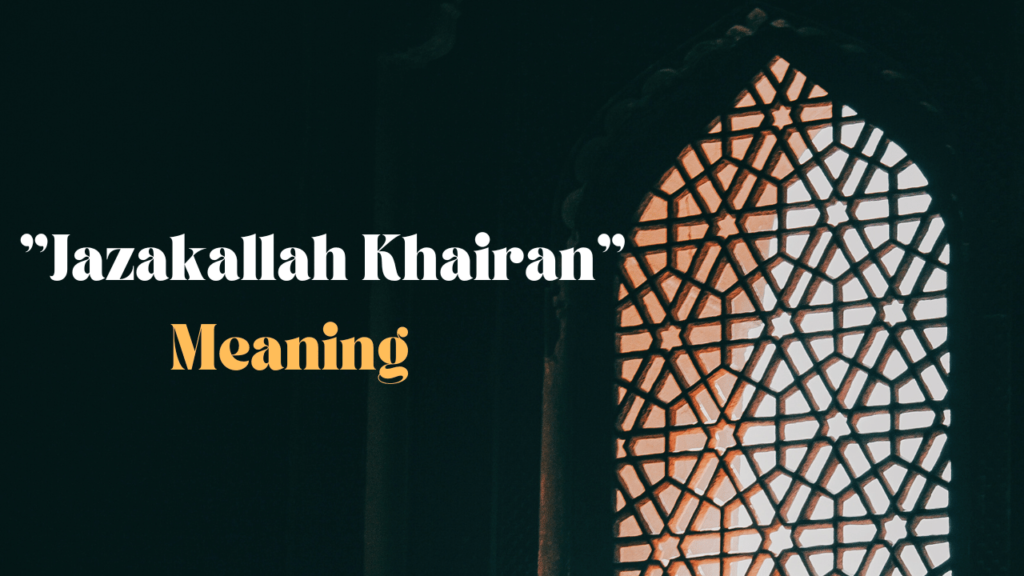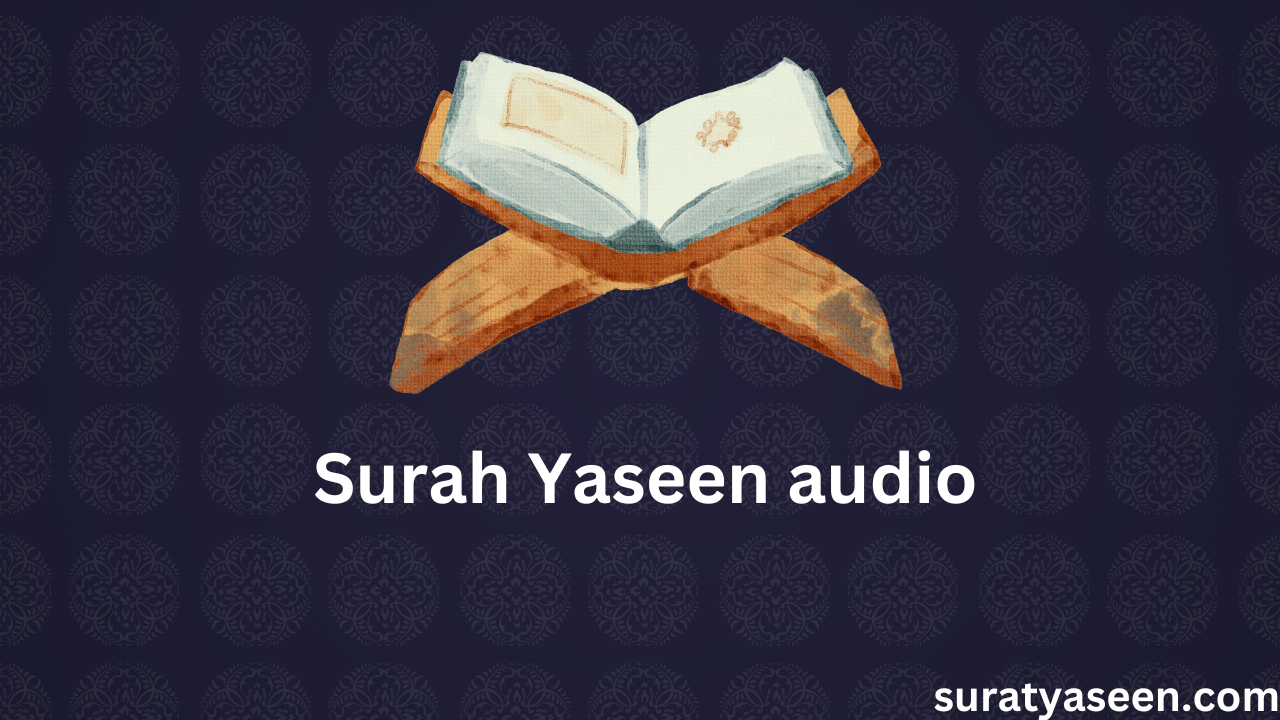“Jazakallah Khairan” Meaning – Expression of Gratitude 2023
Introduction
In Islamic culture, expressing gratitude is of paramount importance. One of the phrases commonly used to convey gratitude is “Jazakallah Khairan”. However, its true meaning and significance may not be widely understood. In this article, we delve into the depths of this beautiful phrase, exploring its literal translation, cultural context, and spiritual essence. Join us as we unravel the profound meaning behind “Jazakallah Khairan” and its impact on individuals and communities.

The Literal Translation of “Jazakallah Khairan”
“Jazakallah Khairan” is an Arabic expression consisting of two parts: “Jazakallah” and “Khairan.” When translated literally, “Jazakallah” means “May Allah reward you,” while “Khairan” means “with goodness.” Thus, when combined, “Jazakallah Khairan” can be understood as “May Allah reward you with goodness.”
Jazakallah khairan meaning in English

The literal translation of “Jazakallah Khairan” from Arabic to English is “May Allah reward you with goodness”. It is a phrase used by Muslims to express gratitude and appreciation to someone who has done a favor, shown kindness, or provided assistance.
The Cultural Context
The usage of “Jazakallah Khairan” is deeply rooted in Islamic tradition and reflects the teachings of Prophet Muhammad (peace be upon him). Muslims are encouraged to express gratitude to one another as a means of fostering unity, brotherhood, and appreciation within the community. The phrase is commonly used to acknowledge acts of kindness, assistance, or any form of beneficial gesture received from others.
The Spiritual Essence
Beyond its literal translation, “Jazakallah Khairan” holds profound spiritual significance. Muslims believe that Allah is the ultimate source of all goodness and rewards. By expressing gratitude with this phrase, individuals recognize Allah’s role as the bestower of blessings and acknowledge that any act of goodness originates from Him. It serves as a reminder that true gratitude should be directed towards the Divine, who facilitates these acts of kindness through others.
Expanding the Expression of Gratitude
While “Jazakallah Khairan” is a commonly used phrase, there are variations and extensions that amplify the gratitude expressed. These include:
a) “Jazakallah Khairan Kathiran” – This phrase adds “Kathiran,” meaning “abundantly,” emphasizing immense gratitude and blessings.
b) “Jazakallah Khairan Ahsan al-Jaza” – Here, “Ahsan al-Jaza” means “the best of rewards,” signifying the desire for the recipient to be blessed with the highest level of reward from Allah.
c) “Jazakallah Khairan Ghafeeran” – By appending “Ghafeeran,” meaning “forgiving,” individuals express gratitude while also seeking forgiveness for any shortcomings.
Read Also : Mashallah Tabarakallah
Conclusion
“Jazakallah Khairan” is far more than a simple phrase of gratitude. It encapsulates the essence of Islamic culture, emphasizing the importance of acknowledging the goodness bestowed upon us by Allah through others. By utilizing this expression, individuals can foster a spirit of appreciation, unity, and humility within the community. So, the next time someone extends a kind gesture, remember to say “Jazakallah Khairan” and let the profound meaning behind these words resonate with your heart. May Allah reward you abundantly with goodness.
Frequently Asked Questions (FAQs) About “Jazakallah Khairan”
What does “Jazakallah Khairan” mean?
“Jazakallah Khairan” is an Arabic phrase commonly used by Muslims to express gratitude. It translates to “May Allah reward you with goodness” or “May Allah bless you.”
When should I say “Jazakallah Khairan”?
You can say “Jazakallah Khairan” to express gratitude when someone has done a favor for you, helped you in any way, or shown kindness and generosity.
Is “Jazakallah Khairan” only used by Muslims?
Yes, “Jazakallah Khairan” is primarily used within the Muslim community as an expression of gratitude and appreciation. However, it can be understood and appreciated by people from different backgrounds as well.
Can I use “Jazakallah Khairan” in written communication?
Absolutely! “Jazakallah Khairan” can be used both in verbal and written communication. It is commonly used in messages, emails, social media comments, and other forms of written expression to convey gratitude.
Are there any variations of “Jazakallah Khairan”?
Yes, there are variations that can be used to amplify the expression of gratitude. Some examples include “Jazakallah Khairan Kathiran” (meaning “May Allah reward you abundantly”), “Jazakallah Khairan Ahsan al-Jaza” (meaning “May Allah reward you with the best of rewards”), and “Jazakallah Khairan Ghafeeran” (meaning “May Allah reward you while forgiving any shortcomings”).
Is it necessary to respond to “Jazakallah Khairan”?
While it is not obligatory to respond to “Jazakallah Khairan,” it is considered good etiquette to acknowledge the expression of gratitude. A simple response like “Wa iyyak” (meaning “And you too”) or “Barakallahu feek” (meaning “May Allah bless you”) is commonly used.
Can non-Muslims use “Jazakallah Khairan”?
Non-Muslims can use “Jazakallah Khairan” if they wish to express their appreciation or gratitude in an Islamic context. However, it is important to be mindful and respectful of cultural and religious sensitivities.
Is “Jazakallah Khairan” only used in formal settings?
“Jazakallah Khairan” can be used in both formal and informal settings. It is a versatile phrase that can be employed in everyday conversations, business interactions, social gatherings, and more.
Why is expressing gratitude important in Islam?
Islam places great emphasis on expressing gratitude as a means of recognizing the blessings bestowed by Allah and fostering positive relationships within the community. Gratitude is considered a virtue that cultivates humility, contentment, and a sense of interconnectedness.
Are there any other ways to express gratitude in Islam?
Apart from “Jazakallah Khairan,” Muslims can express gratitude through phrases such as “Alhamdulillah” (meaning “Praise be to Allah”), “Shukran” (meaning “Thank you”), or simply by praying for the person who has done a good deed for them. Each expression carries its own unique significance within Islamic culture.
Can I use “Jazakallah Khairan” to express gratitude to Allah?
No, “Jazakallah Khairan” is specifically used to express gratitude to fellow human beings for their kindness and assistance. To express gratitude to Allah, Muslims typically use phrases like “Alhamdulillah” (Praise be to Allah) or engage in prayers and supplications.
Is there a specific time or place to say “Jazakallah Khairan”?
“Jazakallah Khairan” can be said at any appropriate time or place. It is not limited to specific occasions or settings. Whenever someone has done something deserving of gratitude, you can sincerely say “Jazakallah Khairan.”
What is the etiquette for pronouncing “Jazakallah Khairan”?
The pronunciation may vary based on regional accents, but a common way to pronounce “Jazakallah Khairan” is “jah-zah-kah-lah khay-ran.” It’s important to speak with sincerity and clarity, ensuring the recipient understands your expression of gratitude.
Does saying “Jazakallah Khairan” have any spiritual benefits?
Yes, expressing gratitude through “Jazakallah Khairan” is considered a virtuous act in Islam. It not only strengthens interpersonal relationships but also purifies the heart, increases mindfulness, and fosters a sense of humility and thankfulness towards Allah.
Can “Jazakallah Khairan” be used in formal written correspondence?
Yes, “Jazakallah Khairan” can be used in formal written correspondence, such as thank-you notes, letters, or emails. It is a polite and respectful way to express gratitude, regardless of the formality of the communication.
Are there alternative phrases similar to “Jazakallah Khairan” in different languages?
Yes, various cultures and languages have their own expressions of gratitude. For example, in Arabic, “Shukran” is another common way to say “thank you.” In Urdu, “Mashallah” is used to express admiration and gratitude. Each language and culture may have its own unique phrases to convey gratitude.
How does “Jazakallah Khairan” contribute to community-building?
“Jazakallah Khairan” plays a crucial role in strengthening communal bonds. By expressing gratitude, individuals acknowledge and appreciate the efforts of others, creating a culture of kindness, support, and unity within the community.
Can I use “Jazakallah Khairan” in non-Muslim countries or communities?
Yes, “Jazakallah Khairan” can be used in non-Muslim countries or communities if you wish to express gratitude in an Islamic manner. It can help promote understanding and appreciation of different cultures and religions.
Is it appropriate to use “Jazakallah Khairan” as a response to a simple compliment?
While “Jazakallah Khairan” primarily expresses gratitude for acts of kindness or assistance, it may not be necessary or appropriate as a response to a simple compliment. A simple “thank you” or a genuine smile would be more suitable in such situations.
What is the significance of adding “Khairan” after “Jazakallah”?
The word “Khairan” adds depth and meaning to the expression. It signifies the desire for the recipient to be rewarded with goodness from Allah. It reflects the sincere intention to wish blessings and positive outcomes for the person who has done a favor or shown kindness.
Can “Jazakallah Khairan” be used in non-Arabic speaking countries?
Yes, “Jazakallah Khairan” can be used in non-Arabic speaking countries. The phrase has transcended language barriers and is understood and appreciated by Muslims worldwide. It has become a universal expression of gratitude within the Islamic community.
Is it necessary to say “Jazakallah Khairan” every time someone does something for me?
While it is not mandatory, expressing gratitude through “Jazakallah Khairan” is highly encouraged in Islamic teachings. It helps foster a culture of appreciation and acknowledgement for acts of kindness and encourages reciprocity and goodwill among individuals.
Can “Jazakallah Khairan” be used to express gratitude in professional settings?
Yes, “Jazakallah Khairan” can be used to express gratitude in professional settings. However, it is essential to consider the context and workplace norms. In more formal environments, a simple “thank you” or a professionally worded expression of gratitude may be more appropriate.
Can “Jazakallah Khairan” be used as a generic response to any favor or assistance?
Yes, “Jazakallah Khairan” can be used as a generic response to any favor or assistance. It is a comprehensive expression that encompasses various acts of kindness, whether big or small. It reflects the sincere appreciation for the person’s efforts.
